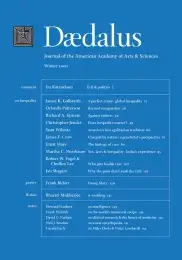A perfect crime: inequality in the age of globalization
Most of the world’s political leaders have embraced economic globalization on two grounds: that open markets and transnational production networks are unstoppable; and that the benefits will surely flow out to all the world’s people, rich and poor. Leading economists and journalists agree, convinced by the logic of laissez-faire, comparative advantage, and technology transfer. Accordingly, they declare, class conflict and competitive struggle are obsolete.
Yet, outside elite circles, conflict and struggle refuse to disappear. In rich countries, electorates and pressure groups remain protectionist and proregulation, even socialist in parts of Europe; there is wide sympathy for the (nonviolent) protestors of Seattle, Davos, and Genoa. In poor countries, globalization is the new synonym for imperialism and colonialism; generally the word evokes collapse rather than common gain. All in all, if the imposition of deregulation, privatization, free trade, and free capital mobility has in fact raised living standards worldwide, gratitude is devilishly hard to find.
So what are the facts? Has globalization hurt or helped? Oddly, researchers do not know; mostly they do not ask. For the doctrine of globalization as it is understood in elite circles contains the curious assumption that the global market is itself beyond reproach. The formulae for success in that market–from openness and transparency to sound finance to investment in education– remain matters of national responsibility; countries that fail have only their own deficiencies to blame. In line with this view, most research has focused on national conditions and national policies, and not on global conditions or the effects of globalization as such.
Whether such a national focus is appropriate, or whether a global view would be better, is a question of great importance. To resolve it, we would need new efforts to measure economic development and social progress across countries around the world–in effect, we would need to write a global report card. But official initiatives in this vein, notably the World Bank’s Human Development Report, are caught in contradictions between the cheerful predictions of globalization theory and what the evidence of epidemics, illiteracy, unemployment, and poverty suggests is actually happening–contradictions that have driven several senior figures (most famously, former chief economist Joseph Stiglitz) out of the Bank. Meanwhile, the International Monetary Fund (IMF) and World Trade Organization (WTO) are today closed societies, sealed off from most forms of serious critical discussion.
So, what can independent research contribute to an understanding of the state of the global economy today? Not much, perhaps, beyond the fragmentary evidence of case studies and field reports. Truly independent scholars usually lack the resources to bring together new information on a global scale.
Still, one broader area has attracted attention: economic inequality and its relationship to economic growth. In this area, data (collated, as we shall see below, from many independent sources) are already available. A rich (but inexpensive) econometrics can be brought to bear. And much hinges on the findings. For, while inequality and economic growth are hardly the only issues in world development–life, health, literacy, and peace are more important–the perceived relationship between these two economic variables underlies development policy in profound ways. . . .
Access the full issue here.
